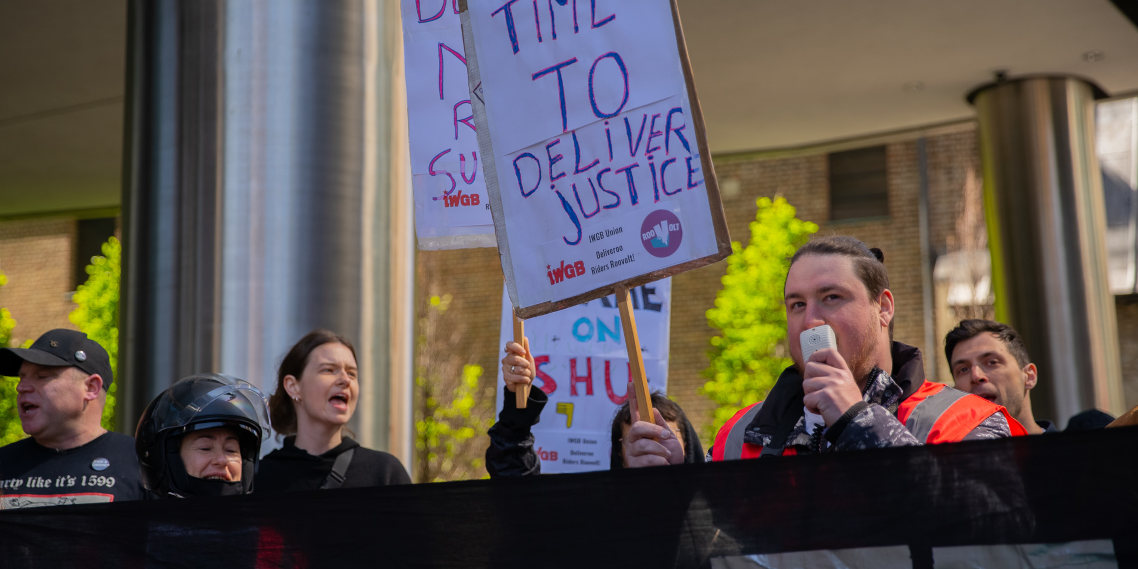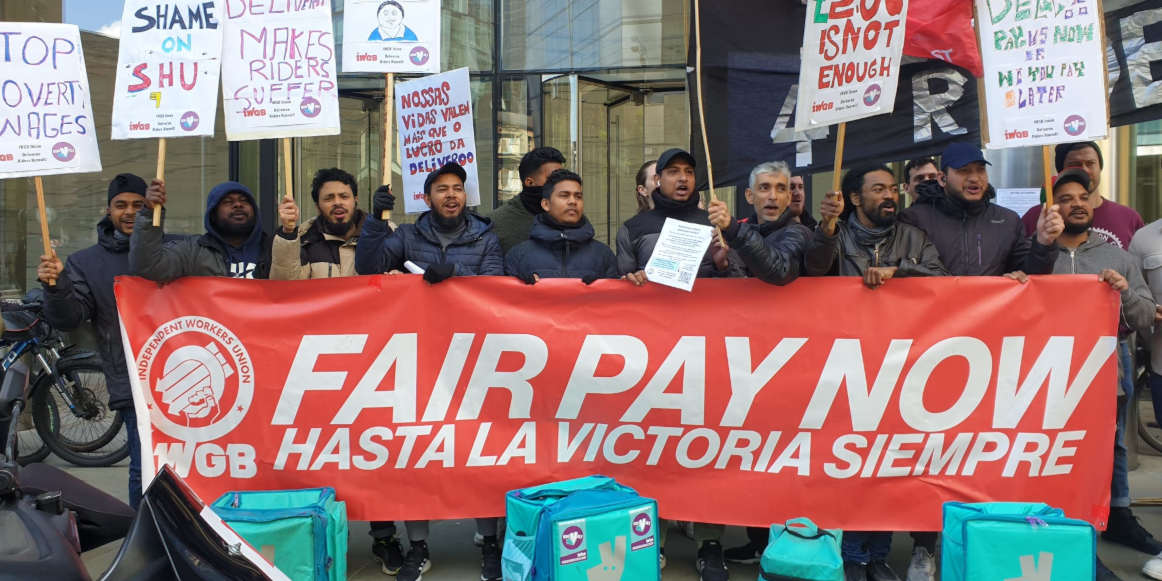For the past four years I’ve worked full-time as a food delivery courier. Like many, I was first attracted to working at Deliveroo because of the flexibility. This remains a chief reason why I continue to do gig work. I love the freedom of being out cycling in London, doing a physically demanding job whatever the weather brings. I’ve come to love the quiet mornings around Clerkenwell or Primrose Hill, maybe tailing my day off with another hectic evening in Soho. Couriering is a job you can be proud of. Despite the stresses, when it’s good it’s great. You’re a part of the city in motion.
But digital platforms have transformed an already solitary job into one that can at times bring extreme isolation. When I started working things were more social. There was a group of riders in the Square Mile where I used to work, and we’d see each other all the time, talking between orders or while passing each other in the city’s warren of streets. A lot of work was coming out then, meaning we could all stay fairly tight.
Following Covid, however, that community of riders slowly dispersed as office work collapsed and fees steadily reduced to the point where you have to work across much larger distances. It’s a peculiar feeling to be immersed in the frenetic pace of the city, to be so present as another day in London unfolds but feel increasingly neither here nor there. The speed is thrilling, and I love it, but it can obscure some unwelcome feelings when you slow down.
Reclaiming freedom
To reclaim some of that early freedom, to secure the space to feel it amidst a pace of work that is increasingly unforgiving, I, like others, had to really intensify how I worked. The only way to do this is to develop an intimate knowledge of London. This knowledge is not easily replaced, it takes time to build. It’s not just going from A to B, it’s how to move around following a delivery to maximise pickup, and also how to interpret prices or multi-app properly. Working at night, moving across short distances through mazes of streets, or of course going in and out of a huge variety of buildings, don’t lend themselves well to using GPS on your phone. And what the customer is essentially buying is speed – the food is getting cold.
The skill and knowledge is necessary for us to earn a living as work has steadily intensified
The skill and knowledge is necessary for us to earn a living as work has steadily intensified – but for me it’s also what brings integrity to the work. The skills we have can’t be degraded. The knowledge that all riders bring is an immense productive power to the systems that we work in, and that should not be forgotten amidst the tech hubris of today.
There’s little question however that we have to labour within highly changeable and precarious conditions. Not only have our fees steadily decreased, and our contracts continue to be insecure, but the work is increasingly commodified, where algorithmic pricing matches the supply of riders with demand volumes to the second. This is increasingly constraining, and in fact anticipating our preferred patterns of work to extract value – adding to those feelings of detachment.
Many of the freedoms therefore which we desire as riders are subject to the processes of work we labour under. We’re not a company that desires the freedom to operate without impediment, or to cut fees and change conditions at will. Yet if we’re to have our voices heard we need one of the most foundational freedoms for all people, the right to freely associate.

Deliveroo riders protesting the company with their union, the IWGB, in May 2023
The battle with Deliveroo
The union I’ve been a member of since 2019, the IWGB, has been trying to secure this right for gig riders for years. And Deliveroo, the defendant in this instance, has fought it aggressively at every turn. This is at odds with their changing public tone towards workers after coming under considerable criticism. But while Deliveroo continues to fight our right to freely associate under article 11 of the European Convention on Human Rights, we have now been granted a final appeal to the Supreme Court.
It was during Covid that I first really understood the need to unionise. While I was already a paid up member, I’d also spent a lot of time figuring out how best to work the apps, mapping out the city and working persistently. This meant my earnings were rising, and I naively thought there was an unspoken agreement and respect for us that substituted somewhat for genuine protections.
However, during lockdown our earnings plummeted; at times I was earning less than £20 a day, and yet Deliveroo and others did nothing but insist on the same fictions as before. That most riders were casual, the implication being that we’re unreliant on the income. Or that rider satisfaction was overwhelmingly high, despite the obvious fact that many people aren’t going to respond negatively to an in-app survey when they have no job protections.
Dismantling fictions
It should be clear to anyone that a service open almost 24/7 in London cannot be serviced by mostly casual riders. It’s deeply disrespectful to the minority of us that do the majority of work, most of whom are migrant workers, to persist with these shallow fictions, perpetuated opportunistically by companies that know their voice currently towers over ours.
Because there is no obligation to work for an account, you cannot create averages; there are wide disparities in the volume of work done. But the fact that we enjoy flexibility does not make us casual. In fact, flexibility is an essential component of how the system can be dynamic enough to service wildly fluctuating demand. It’s born out of the logic of profit, not from the wishes of riders. And for us it’s subject to a range of considerations and constraints.
If we’re to truly improve our working conditions, and to win the promise of freedom at work, we cannot concede highly generalisable terms such as flexibility or freedom to the shallow definitions of the marketplace. We must listen to our own voices and collectivise our fight, not labour in isolation. And the first step towards that is joining a union and organising together.










